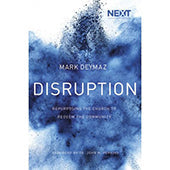by Mark DeYmaz, excerpted from Disruption: Repurposing The Church To Redeem The Community.
In the summer of 2010 I had the privilege of driving my oldest daughter, Emily, to Liberty University in Lynchburg, Virginia, where she spent her freshman year in college. Two days on the road together provided us with quality time to enjoy the experience, good conversation, and some music.
Now, I came of age in the 1960s and 1970s, so my idea of “good music” is the Beatles, Fleetwood Mac, Boston, Jackson Browne, and the like. Behind the wheel, then, I had the sunroof open, the speakers cranked, and Crosby, Stills, Nash, and Young in the queue as we pulled out of Little Rock on a sunny August morning.
Forty-five minutes or so into the trip, however, Emily asked if she could plug her iPhone in to the speakers and listen to some of “her” music. “Sure, sweetheart,” I said, though deep in my heart it was not something I wanted to do. That’s why about thirty minutes later I suggested we take turns the rest of the way listening to each other’s playlists!
Under this arrangement, I mostly endured the first day whenever the time came for Emily to play the bands and songs she liked. Her taste in music was different than mine. Generally, the bands were unfamiliar to me and the sound not something to which I was accustomed.
By the second day, though, as some of the songs repeated, I began to catch the beat, understand the words, learn more about the bands, and sing along. That’s why two days later, while saying good-bye to Emily outside her dorm, I made sure to get some of her music—certain songs and artists she had introduced to me—to download and enjoy on the return trip home. In fact, they remain on my playlist to this day. No longer new, they are now a reflection of my own musical taste.
Isn’t it interesting?
Generally speaking, we typically don’t like new music the first time we hear it. We don’t know the artist. We don’t understand the lyrics. We can’t catch the beat. With this in mind, American music critic Steven Hyden wrote: “Even for a professional, following new music takes a lot of time and effort. . . . You have to be willing to wade into unfamiliar waters to find the most exciting artists, and that can be tough for older listeners who are accustomed to music with firmly established parameters. Sometimes, it’s just easier to stick with what you know.”
As Hyden suggested, it may be easier to stick with what you know, but that would be a big mistake for those of us leading the church today with an eye on the future.
Sticking with our firmly established parameters of effectiveness and the traditional metrics of success to which the American church has long been accustomed is no longer an option for pastors and local churches seeking to advance the kingdom of God in a rapidly changing, demographically shifting society.
The fact that you have read this far demonstrates your willingness to wade into unfamiliar waters, and that’s encouraging. Yet make no mistake: wrapping your head, heart, and hope around the “new music” I intend to play for you in this book will, similarly, take some time and effort. At first, it may not be easy for you to understand the why or to process the how. Nevertheless, let me encourage you to keep listening.
Disruption is a practical guide that will help you to rethink church and repurpose it to advance spiritual, social, and financial redemption in your community for the sake of the gospel.
Whether your church is currently growing, plateauing, or declining, if you are a church planter, pastor, or denominational or network leader, this book will help you understand why conventional wisdom must today be challenged, what new practices must be established, and how current metrics largely informed by affluent, majority-culture evangelicalism from the past cannot be the primary measure of church health and effectiveness in the future.
I’m talking about repurposing the church to redeem the community.
— Mark DeYmaz, Disruption: Repurposing The Church To Redeem The Community. Learn more about this book.
How To Use This Book
To advance a credible gospel in the days ahead, local churches will need to revitalize property, leverage assets, and encourage small business to help create jobs, reduce crime, generate taxes, attract investments, and bring systemic change to the community.
What Mark DeYmaz has developed through critical thinking and practical application is a new standard by which every local church should establish its priorities and measure its effectiveness.
If you are wondering how to impact your community in the shifting social, political, and economic world we live in, read Disruption to plan strategically, progressively, and creatively.

